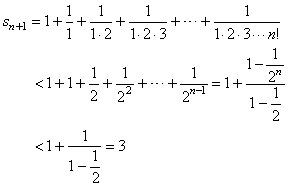|
|
Series |
 Infinite series
Infinite series |
 Alternating
series
Alternating
series |
|
Alternating series test
or Leibnitz's
alternating series test |
|
Absolute
convergence |
|
Conditional
convergence |
 Series
of positive terms
Series
of positive terms |
|
|
|
|
|
|
|
| Alternating
series |
| A
series the terms of which are alternately positive and negative is
called the alternating series. |
| Alternating series test
or Leibnitz's
alternating series test |
| An
alternating series converge if the absolute values of its terms decrease
monotonically to zero as n
tends to
infinity. |
| Given
an alternating series a1
-
a2 + a3 -
+
·
·
·
+
(-1)n
-
1
an +
·
·
· |
| suppose
a1
> a2 > a3 >
·
·
·
> an
> an
+ 1 > ·
·
·
> 0
and |
 |
|
| The
sequence of the partial sums sn
of the series alternate approaching the same limit s.
The terms of s2n
of the
even
indices,
increase while the terms of s2n
+ 1 of the odd indices,
decrease as is shown on the number line
below. Every term of the sequence of an even index is smaller than every
term of an odd index therefore, s2n
< s
< s2n
+ 1 |
 |
| and |
 |
|
|
|
| Example: Let
show that the series |
 |
converges. |
|
| Solution: The
given alternating series converges since the sequence of absolute values of its
terms |
| |
 |
that
is, |
 |
|
|
| decrease to zero as
n
tends to infinity, or |
 |
The
series converges to ln
2 or s
= ln 2. |
|
| Note
that the given logarithmic series is not absolutely convergent since |
 |
| obtained
harmonic series diverges. |
| Therefore,
the series |
 |
is
said to be conditionally convergent. |
|
|
| Example: Let
show that the series |
 |
converges. |
|
| Solution: The
given alternating series converges since the sequence of absolute values of its
terms |
| |
 |
that
is, |
 |
|
|
| decrease to zero as
n
tends to infinity, or |
 |
As
Leibnitz proved, the
series converges to p/4. |
|
|
| Absolute
convergence |
| An
infinite series |
 |
is called absolutely convergent if the infinite series |
 |
is convergent, i.e., |
|
|
the series
of absolute values of its
terms converge. |
| Thus,
if a series is absolutely convergent, then both series, |
 |
|
|
| Example: Let
show that the series |
 |
is
absolutely convergent. |
|
| Solution: Given
series is absolutely
convergent since the series
of absolute values of its
terms |
| |
 |
converges
to 2, |
 |
|
|
| Therefore,
the series |
 |
is
convergent and its sum is 2/3. |
|
|
| Example: Let
show that the series |
 |
is
absolutely convergent. |
|
| Solution: Given
series is absolutely
convergent since the series
of absolute values of its
terms |
 |
| Therefore,
the series converges and its sum |
 |
|
|
| Conditional
convergence |
| If
an infinite series |
 |
is not convergent, it is called divergent. However, if it is convergent
but not |
|
|
absolutely convergent,
it is called conditionally convergent. |
|
| Series
of positive terms |
| Suppose
the series |
 |
consists
of positive terms only. Then its partial sums |
 |
form
an |
|
| increasing sequence, therefore given series converges if and only if
the sequence of partial sums {sn}
is bounded. |
|
We use this property for convergence tests of series with positive
terms. |
|
| Example: The series of positive terms |
 |
| converges
since |
 |
| that
is, the sequence of partial sums is
bounded above, and the series converges to the number e. |
| If
we calculate the partial sum of first 10 terms of the series,
s10
= 2.718281
obtained
is the number e
to six
correct
decimal digits
what shows that the series
increases relatively fast. |
|
|
|
|